
“It is nonviable to prohibit a feeling,” firmly states photographer Ashley Zhang about the fallacy many people have regarding the inhibition of taboo relationships. Seeing something unique in the relationships of people she knew, she decided to document their romantic moments on film. She hopes to someday normalize this topic in her immediate and broader societies.
We hate banner ads too. Download our app for iOS, iPad, and Android and get no banner ads for $24.99/year.
German-American singer Haddaway famously opened his 1993 song with the lyrics, ‘What is love,” something that no doubt many of us consistently ask ourselves on a regular basis. Ashley Zhang also asked herself the same but decided to show it in her photo series Lovers as well. Focusing on couples from her social circles, she says that love of all kinds needs respect and normalization.
The Essential Photo Gear Used by Ashley Zhang
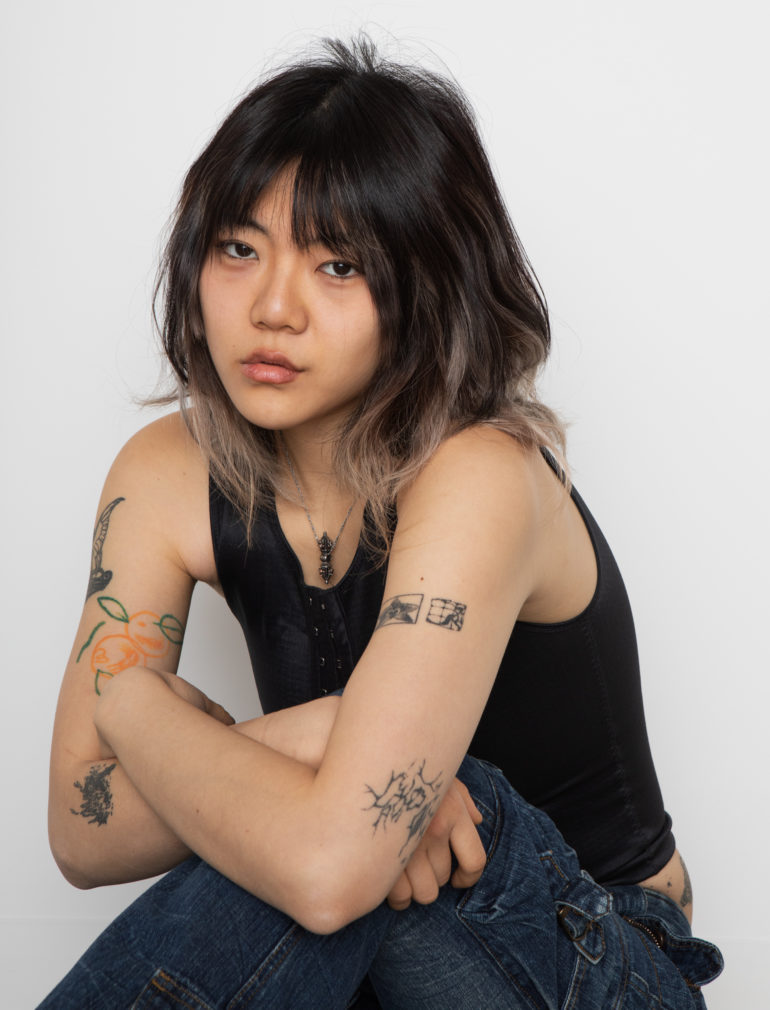
Ashley told us:
When I do choose to go for a cleaner, more polished look, I find myself choosing the Sony a7riii. Using Sony had never crossed my mind when I was younger, a hardcore brand follower of Canon, but when I transferred schools, I thought it would be good to try out new cameras as well.
The Phoblographer: Hi Ashley. Please tell us about yourself and how you got into photography.
Ashley Zhang: I’m a 21-year-old photographer from New York. I had always had an affinity for art, anything of the sort. My childhood dreams went from Actress to Singer to Author to Photographer and more of the sort. I began photographing random images on my iPod touch when I was about thirteen. It came very naturally to me as if I had been yearning to capture something with my own hands all along. I remember how it first began. One spring day, when I was thirteen or fourteen, the flowers of the tree in my house’s front yard had finally bloomed. I got off the school bus, ran up to my father’s bedroom and rummaged around for his point-and-shoot camera, sprinted back down and up the tree, and photographed one of the blossoms. From there on, I made photography my main artistic practice. I liked it a lot, and I felt that it came the most naturally to me.
I went from shooting on my dad’s old Canon Rebel XT to his newer T3i in the following years when he felt that I had learned more than him and, therefore to him, earned it. I fell in love with the practice, and soon it was my thing. From my first paid shoot—of a grand total of five dollars—to be a yearbook photographer to then going on to major in photography, this practice has been central to my life for the past decade.
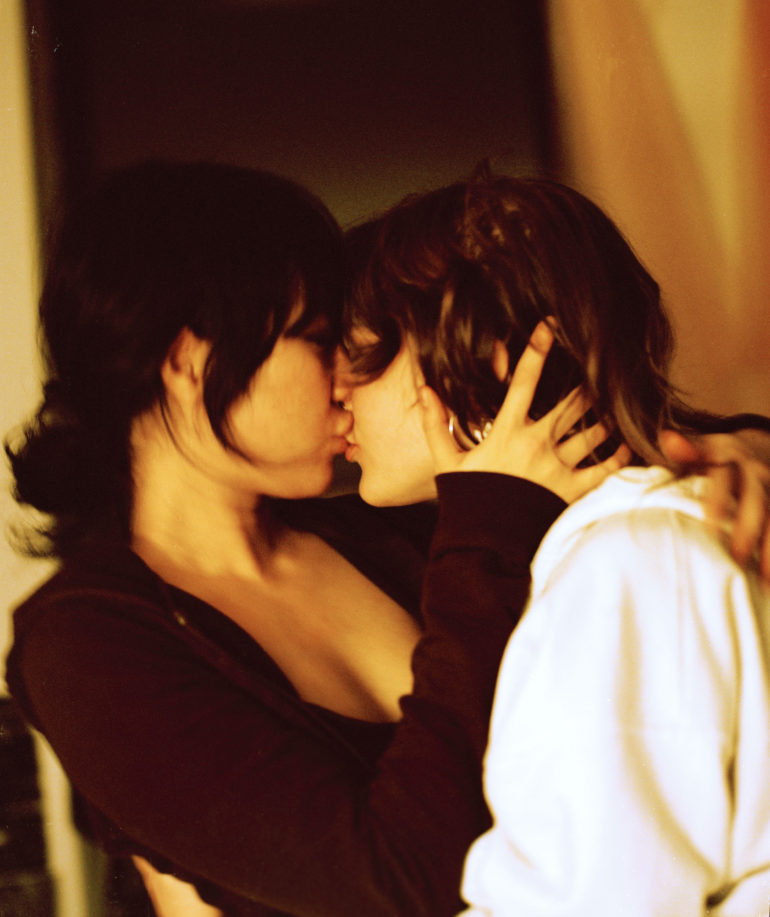
The Phoblographer: What’s the story behind Lovers? Where did the inspiration for this project come from?
Ashley Zhang: If I’m anything, it’s a hopeless romantic. The feeling of love, tenderness, and sexuality seems to be at the forefront of all my artistic work, even if I’m not intending for it to be. The inspiration for Lovers came from my own internal desire to love and be loved, to paint a world defined by love alone.
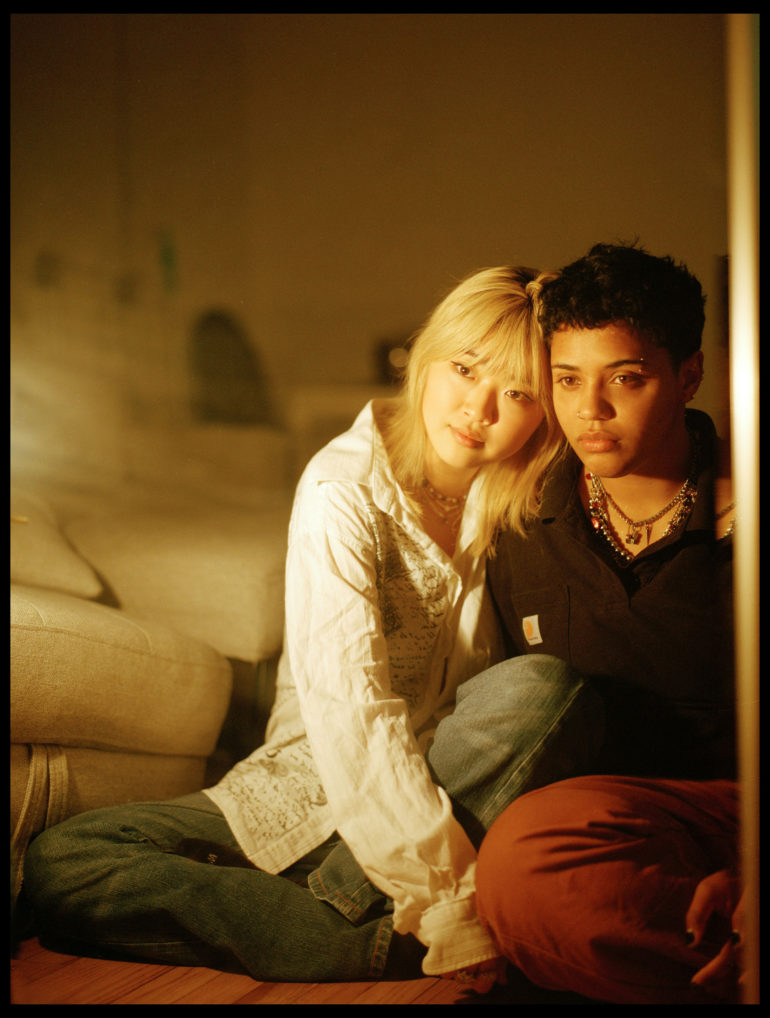
The Phoblographer: Is it more about forbidden and taboo kinds of love? Tell us why or why not?
Ashley Zhang: Lovers is definitely inspired by highlighting queerness and queer relationships. However, I wanted to avoid creating a project that focuses solely on queer love for fear of alienating it. I find that often, when anything so underrepresented for so long gets its (deserved) time in the light for respect and reparations, to the average viewer it becomes a fad, trend, a sort of fashion. In doing so, it becomes almost counterproductive. The attempt to “normalize,” for lack of a better word, by showcasing becomes a sort of segregation in the end, almost patronizingly. Lovers are inspired by my own queerness and queer relationships, but it is with respect that I choose not to make it the forefront of the project.
Queer love does not need to be treated so in order for its tenderness and power to bleed into the image. After all, love is love, and queer love speaks on its own.
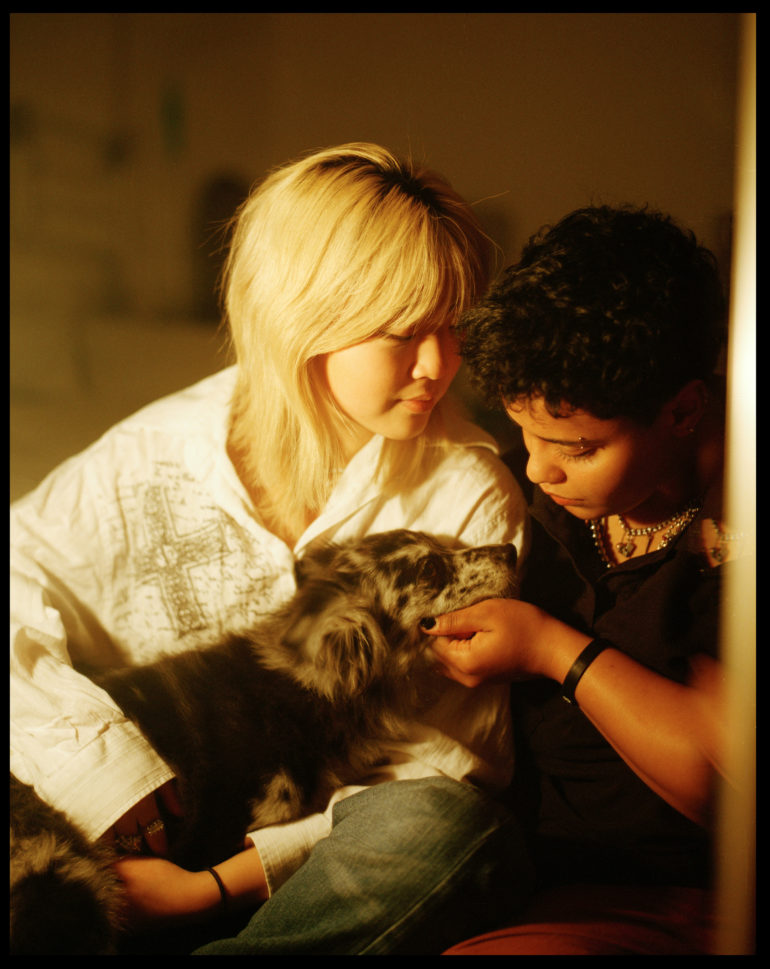
The Phoblographer: Are the couples in Lovers couples in real life too? Did they explore and discover more about themselves while participating in your photoshoots?
Ashley Zhang: The subjects in the series are all people in my own life. They are all real couples, and they were chosen for their particular nature of loving. Each time I had seen these couples interact, I had been touched by some sort of their tender nature.
Gigi and Violet were one of my first choices. At the time, 17 and 16, respectfully, the two became an icon of young queer love for me. So natural it was for them, almost seamless. I felt touched by their relationship, by how far western society has come to view this relationship. It made me a bit emotional, looking back at my own teenagehood and how I still felt fear when it came to being involved in non-heterosexual relationships.
When I asked each couple to pose, I asked them a few questions about their relationship. How they met, how they saw each other, and how each person had changed the other’s life. The room was filled with memories of love.
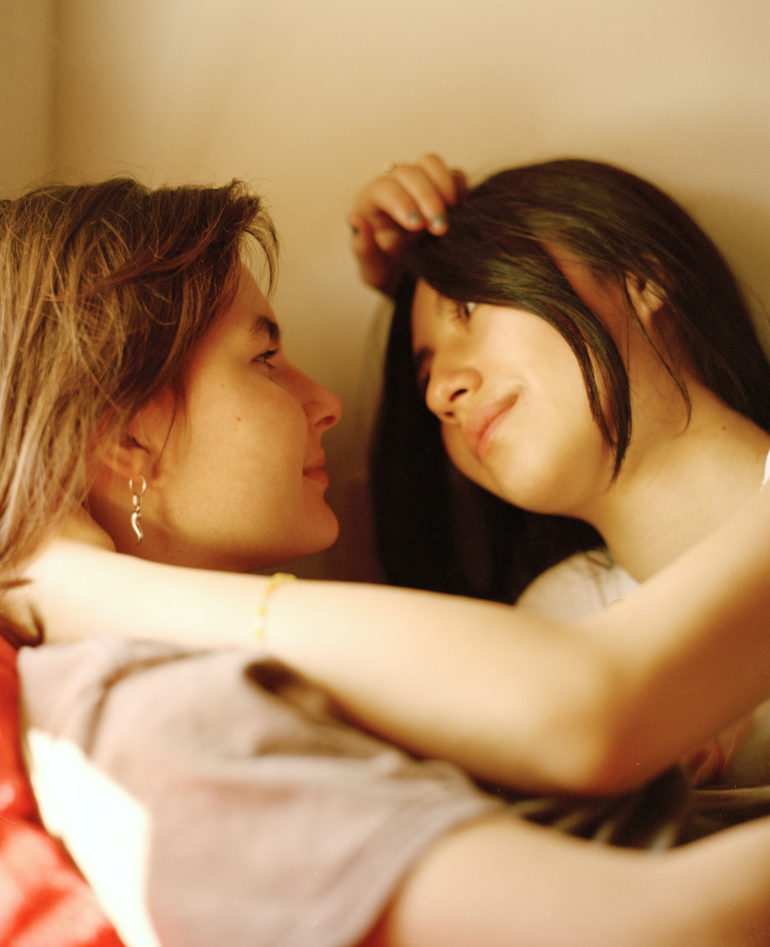
The Phoblographer: When someone mentions the word love, what’s the first thought that comes to your mind?
Ashley Zhang: Rather than a thought, a feeling ensues. It is difficult to explain. Weightless is perhaps the best way to describe it. But rather than a floating sensation, it is more as if I had the same gravitational pull as air. Suspension in space and time. I am slightly lifted, and there is a steady, fluttering sensation in my chest. I am not afraid to be lifted, knowing there is something to fall back on. Steady, strong, soft, welcoming. That is how I feel.

The Phoblographer: I like the pictures’ warm tones and almost film-like feel. Tell us how you shot them please.
Ashley Zhang: Thank you! I shot these on a Mamiya RZ67, to which I credit this warm and cinematic look.
It achieves this warmness and tenderness I find very difficult to achieve with a colder, steelier digital look. I scan my rolls myself with a drum scanner. It takes more time, but it is definitely worth it. I say it’s even integral to my color palette and editing style.
The mirrorless nature of the [Sony A7R III] allows for impeccable detail, and the grayish color profile gives incredible leeway for post-processing and manipulation. For art and work that borders commercial and editorial, I find that it is the best option for me.
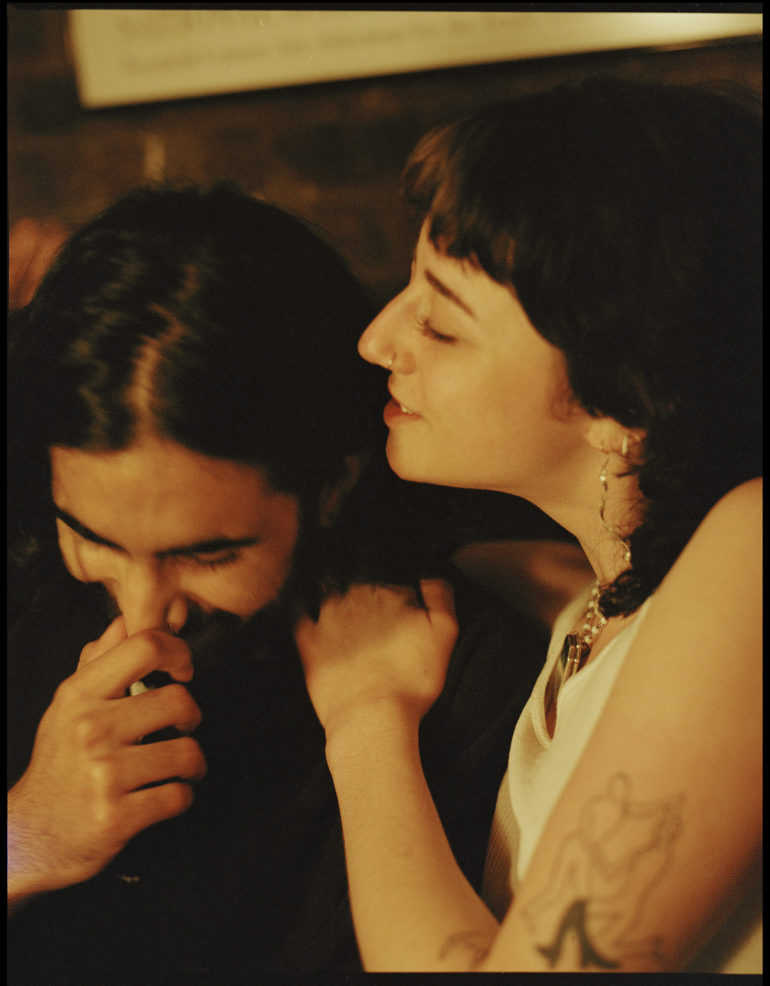
The Phoblographer: Can anyone put limitations on love? Why is there so much oppression and suppression of this in today’s world?
Ashley Zhang: This is a difficult question. I’m sure we’re all aware that limitations have and can be put on love. To explain the history of oppression in regard to gender and sexuality is an endless response, much of which has little to do with love and all to do with power, hierarchy, and control. However, these limitations are superficial at best in defining human nature. It is nonviable to prohibit a feeling, and one so integral to the human experience, even more.
All images by Ashley Zhang. Used with permission. Check out her website and her Instagram page to see more of her work.
Want to have your work featured? Here’s how.






